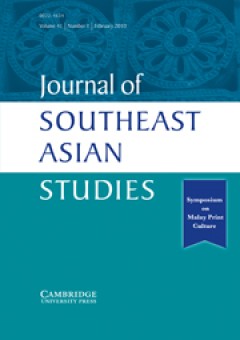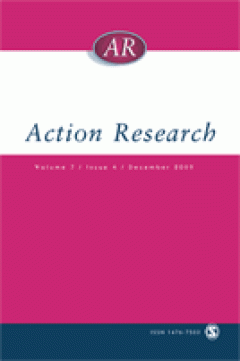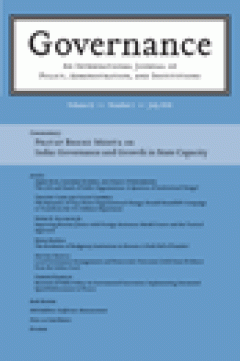Filter by

Localisation, regionalism and the history of ideas in Southeast Asia
Much analysis of Asian regional relations and institutions is written in an historical and cultural vacuum. The impression is often given that security or economic arrangements are comparable with physical structures — creations of engineers rather than social scientists (or even architects). The writings of Amitav Acharya, now Professor of International Affairs at American University in Washin…
- Edition
- Volume 41, Number 3, October 2010.pp.541-549
- ISBN/ISSN
- 00224634
- Collation
- -
- Series Title
- Journal of Southeast Asian Studies
- Call Number
- -

Conflicting demands and the power of defensive routines in participatory acti…
Participation has been of ongoing interest in the field of action research and the New Health Promotion movement, but it is not without tensions and problems. This article presents the challenge of containing the conflicting demands of personal empowerment, practical advancement and theory building in a community-based participatory action research project ‘Aspiring to Healthy Living in The Net…
- Edition
- Vol. 8 no. 4, December 2010.pp. 367-386
- ISBN/ISSN
- 14767503
- Collation
- -
- Series Title
- Action Research
- Call Number
- -

Using action research to develop a research aware community pharmacy team
An action research approach was applied to develop a community pharmacy team into a research aware practice. A pharmacy team consisting of a pharmacist and medicine counter assistants carried out this project. They started by reflecting on their own practice and in doing so examined the reliability of the evidence base they used to give advice to customers regarding the sale of medicines. The t…
- Edition
- Vol. 8 no. 4, December 2010.pp.387-406
- ISBN/ISSN
- 14767503
- Collation
- -
- Series Title
- Action Research
- Call Number
- -

Between idealism and reality: Meeting the sagepub. challenges of participator…
Participatory action research (PAR) is a methodological stance that researchers can find both inspiring and daunting. Community-based PAR offers a platform by which social scientists can contribute to the democratization of knowledge and its production, but also requires that they go beyond conventional roles and procedures to interact with community co-researchers in ways that may leave univer…
- Edition
- Vol. 8 no. 4, December 2010 .pp. 407-425
- ISBN/ISSN
- 14767503
- Collation
- -
- Series Title
- Action Research
- Call Number
- -

Participatory photography: A tool for empowerment or surveillance?
Based on a case study of a participatory photography project with a Salvadoran adult literacy program, this article explores some of the challenges and risks that arise when people use cameras to document their lives. The article examines the unanticipated problems the author and participants encountered (i.e. suspicion, timidity, and ridicule), and elucidates how historical and sociocultural f…
- Edition
- Vol. 8, no. 4, December 2010.pp. 426-443
- ISBN/ISSN
- 14767503
- Collation
- -
- Series Title
- Action Research
- Call Number
- -

More Knowledge, Better Government? Consequences of Knowledge-Based Decision M…
Using an example from the health-care sector, we illustrate consequences of implementing knowledge-based decision making relating to the exercise of political control. The Swedish Pharmaceutical Benefits Board decides the subsidization status of prescription pharmaceuticals. Building on a study of the agency's work, we explore the effects of institutional arrangements stemming from rationalisti…
- Edition
- Volume 24, Issue 1, January 2011. pages 85–110
- ISBN/ISSN
- 09521895
- Collation
- -
- Series Title
- Governance
- Call Number
- -

Traditional Leaders and the Culture of Governance in South Africa
The global neoliberal economic and political order impregnated the emergence of democracy in South Africa. One of the hallmarks of this order is that the capacity of the state to transform society is constrained, particularly in the rural hinterlands. The incapacity of the state to extend its grip, both economically and politically, has provided traditional leaders with an opportunity to both r…
- Edition
- Volume 24, Issue 1, January 2011. pages 5–29
- ISBN/ISSN
- 09521895
- Collation
- -
- Series Title
- Governance
- Call Number
- -

Power Sharing and Inclusive Politics in Africa's Uncertain Democracies
Power-sharing agreements have been widely used in Africa as paths out of civil war. However, the research focus on conflict mitigation provides an inadequate guide to recent cases such as Kenya and Zimbabwe. When used in response to flawed elections, pacts guaranteeing political inclusion adversely affect government performance and democratization. Political inclusion in these cases undermines …
- Edition
- Volume 24, Issue 1, January 2011. pages 31–53
- ISBN/ISSN
- 09521895
- Collation
- -
- Series Title
- Governance
- Call Number
- -

Transgovernmentalism Meets Security: Police Liaison Officers, Terrorism, and …
Studies of transgovernmental activities have enhanced our understanding of changing global politics, but their claims have not been fully investigated with respect to the security realm. Therefore, this article first acknowledges a gap between the practices and capacities of nonstate entities creating transnational threats and those of state-based agents of response. States' ability to respond …
- Edition
- Volume 24, Issue 1, January 2011. pages 55–84
- ISBN/ISSN
- 09521895
- Collation
- -
- Series Title
- Governance
- Call Number
- -

A Contagious Concept: Explaining the Spread of Privatization in the Telecommu…
Qualitative studies suggest that the spread of privatization of public utilities is due to a change of the economic paradigm and institutional isomorphism pressures. However, current quantitative studies mostly account for domestic factors. These factors can explain differences in national privatization trajectories but cannot explain the large trend. Based on a quantitative analysis of privati…
- Edition
- Volume 24, Issue 1, January 2011. pages 111–139
- ISBN/ISSN
- 09521895
- Collation
- -
- Series Title
- Governance
- Call Number
- -

Toward a New Era of Administrative Reform? The Myth of Post-NPM in New Zealand
This article explores the supposed shift from New Public Management (NPM) to a new era of “post-NPM” by looking at one critical case, New Zealand. It finds limited evidence of such a shift, suggesting that the wider literature needs to move to a more careful methodological treatment of empirical patterns. To contribute to such a move, this article applies a three-pronged approach to the study o…
- Edition
- Volume 24, Issue 1, January 2011, pages 141–166
- ISBN/ISSN
- 09521895
- Collation
- -
- Series Title
- Governance
- Call Number
- -

The New York School of Philanthropy, the Bureau of Municipal Research, and th…
This article uses archival research to analyze the role of the New York School of Philanthropy as a precursor to the Bureau of Municipal Research (BMR) Training School, which is generally considered the first professional public administration program in America. The article argues that the two organizations had similar curricula and aspirations in the early Progressive period, particularly fro…
- Edition
- Vol. 43 no. 1, January 2011.pp. 3-21
- ISBN/ISSN
- 00953997
- Collation
- -
- Series Title
- Administration & Society
- Call Number
- -

Public Organizations and Mission Valence : When Does Mission Matter?
Given the service- and community-oriented nature of organizational goals in the public sector, it is not surprising that public management scholars have highlighted the potential of the missions to be an asset of public organizations. To date, however, little empirical research has investigated ways in which these benefits can be cultivated. The present study of mission valence—based on a sampl…
- Edition
- Vol. 43 no. 1, January 2011.pp. 22-44
- ISBN/ISSN
- 00953997
- Collation
- -
- Series Title
- Administration & Society
- Call Number
- -

On the Nature and Strategies of Organized Interests in Health Care Policy Making
Relying on a sweeping review of the literature on interest group influence in health care policy making, we propose a basic definition and a typology of interest groups in provincial health care policy making. Then, using Milbrath’s communication framework, we analyze organized interests’ strategies for influencing policy making. This article is a modest attempt to cross-fertilize the group the…
- Edition
- Vol. 43 no. 1, January 2011.pp. 45-65
- ISBN/ISSN
- 00953997
- Collation
- -
- Series Title
- Administration & Society
- Call Number
- -

Continuing an Alternative View of Public Administration : Mary van Kleeck and…
This article argues that from 1918 through 1927 prominent social scientist and reformer Mary van Kleeck (1883-1972) pursued an alternative theory of public administration enunciated by women reformers in the early 1900s. van Kleeck continued to support the theory through her idea of industrial citizenship, through which labor and capital would work as equals. Two new forums for her idea—the Int…
- Edition
- Vol. 43 no. 1, January 2011.pp. 66-86
- ISBN/ISSN
- 00953997
- Collation
- -
- Series Title
- Administration & Society
- Call Number
- -

Strategic Planning As an Effective Tool of Strategic Management in Public Sec…
This study determines the effectiveness of strategic planning as an effective tool of strategic management in public transit agencies. It finds that an effective strategic planning requires top managers’ active roles in defining the strategic direction of the organization and creating an environment that recognizes strategic planning as a tool of strategic management. Also, it requires good wor…
- Edition
- Vol. 43 no. 1, January 2011.pp. 87-123
- ISBN/ISSN
- 00953997
- Collation
- -
- Series Title
- Administration & Society
- Call Number
- -

Out of the Woods : Facilitating Pragmatic Inquiry and Dialogue
In “Into the Woods,” Karen Evans describes an increasingly hollow public administration environment that is shaped by a misplaced quest for efficiency. She looks to the pragmatism of John Dewey as a way to remedy the situation. This article extends her analysis by linking pragmatism to reflective thought, inquiry, nonlinear dynamics, and communication theories. Finally, a few suggestions for ho…
- Edition
- Vol. 43 no. 1, January 2011.pp. 124-132
- ISBN/ISSN
- 00953997
- Collation
- -
- Series Title
- Administration & Society
- Call Number
- -

On the Problem of Adopting Pragmatism in Public Administration
Answering the question, “Should public administration adopt pragmatism?” requires some agreement on what pragmatism means and what that adoption might entail. This article argues that such agreement does not currently exist and, without it, calls by administrative theorists for adoption will not receive their intended responses.
- Edition
- Vol. 43 no. 1, January 2011.pp. 133-141
- ISBN/ISSN
- 00953997
- Collation
- -
- Series Title
- Administration & Society
- Call Number
- -

KANT'S CONCEPT OF INTERNATIONAL LAW
Modern theorists often use Immanuel Kant's work to defend the normative primacy of human rights and the necessity of institutionally autonomous forms of global governance. However, properly understood, his law of nations describes a loose and noncoercive confederation of republican states. In this way, Kant steers a course between earlier natural lawyers such as Grotius, who defended just-war t…
- Edition
- Volume 16, Number 4, December 2010.pp.229-257
- ISBN/ISSN
- 13523252
- Collation
- -
- Series Title
- Legal Theory
- Call Number
- -

How We See Them Versus How They See Themselves: A Cognitive Perspective of Fi…
The present study complements current firm—nongovernment organization (NGO) literature by emphasizing the influence of managerial cognition on organizational behavior. In particular, I find that NGOs confront or seek to collaborate with other NGOs or with firms to appear as legitimate actors before selected third parties and as a way to access various sources of funds. By contrast, firm manager…
- Edition
- Vol. 49 no. 1, March 2010.pp. 116-139
- ISBN/ISSN
- 00076503
- Collation
- -
- Series Title
- Business Society
- Call Number
- -
 Computer Science, Information & General Works
Computer Science, Information & General Works  Philosophy & Psychology
Philosophy & Psychology  Religion
Religion  Social Sciences
Social Sciences  Language
Language  Pure Science
Pure Science  Applied Sciences
Applied Sciences  Art & Recreation
Art & Recreation  Literature
Literature  History & Geography
History & Geography